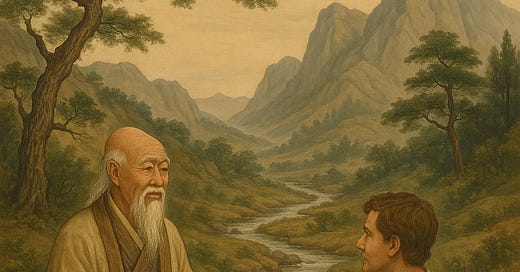The Art of Effortless Living: Returning to the Flow of Life
“The Tao does nothing, yet through it all things are done.”
— Tao Te Ching, translated by Stephen Mitchell
What if life wasn’t meant to be a battle of willpower?
What if the deepest intelligence in the universe was not found through effort, striving, and control—but through surrender, trust, and ease?
This is the quiet invitation of Wu Wei, one of the most paradoxical and powerful concepts in the Tao Te Ching. Often translated as “effortless action” or “non-doing,” Wu Wei isn’t about laziness or passivity. It’s about becoming so attuned to the rhythm of life that your actions align perfectly with the moment, as if life itself were moving through you.
You don’t push the river. You flow with it.
The Feeling of Wu Wei
To live in Wu Wei is to feel as though life breathes you, moves you, and expresses itself through you. Imagine a musician improvising on stage, eyes closed, completely immersed in the sound. Or a surfer catching the perfect wave—not thinking, just being, in perfect harmony with the swell.
It feels like coming home to yourself, after years of pretending to be someone else.
It feels like lightness. Like clarity. Like being carried.
You stop gripping, and are carried by something far wiser than your plans: the Tao, the Way.
The Left Brain: The Great Interrupter
But this isn’t the way most of us live. From early on, we’re trained to listen to the left hemisphere of our brain—the part that categorizes, analyzes, and tries to control. As Iain McGilchrist explains in The Master and His Emissary, the modern world is dominated by this hemisphere. It prefers certainty over mystery, control over emergence, repetition over renewal.
This part of the mind cannot grasp Wu Wei.
Because Wu Wei belongs to the right hemisphere—the intuitive, relational, present-oriented side. It knows the world not by dissecting it, but by being in it. It dances, it feels, it connects. It doesn’t need to “figure it out”—it knows.
And yet, in most of us, the left brain holds the microphone.
The Survival Instinct: Author of the Stagnant Self
Why? Because of the survival instinct. Deep in our biology is a system designed to protect us—but in today’s world, it often limits us. The survival instinct doesn’t care about harmony, wisdom, or creativity. It wants control. And so it builds a persona, a mask—a stagnant identity—to shield us from uncertainty.
This identity is stiff and inflexible. It says, “I am this. I must be this. I must protect this.” But Wu Wei can only arise when we are fluid, empty, and undefended.
As Alan Watts said:
“The more a thing tends to be permanent, the more it tends to be lifeless.”
To embrace life’s effortless flow, we must let go—not just of beliefs, but of the belief that we are our beliefs. Not just of control, but of the illusion that we were ever in control.
Letting Go Into Presence
The book Presence by Peter Senge, Otto Scharmer, Joseph Jaworski, and Betty Sue Flowers points to a deeper state of being that arises when we let go of the need to predict and control. In this state, we are no longer driven by the fears of the past or the expectations of the future. We “presense” what is emerging, and respond with a creativity that doesn’t come from us—but through us.
Eleanor Rosch, a pioneer in cognitive psychology and contributor to The Embodied Mind, reminds us that this state is not about abstraction. It’s deeply embodied. It is direct knowing—not as an idea, but as a lived experience. The body knows how to move. The heart knows how to open. The Tao knows how to live.
We only need to stop interfering.
Returning to the Way
The Tao Te Ching says:
“Do you have the patience to wait till your mud settles and the water is clear? Can you remain unmoving till the right action arises by itself?”
Living this way is not about achieving anything. It is about undoing—unlearning the habit of struggle, loosening the grip of identity, and releasing the need to always “know.”
It’s about trusting that the Tao is already moving, already flowing, and that your place in it is not earned by effort, but discovered through surrender.
Effortless Doesn’t Mean Passive
It means aligned.
It means doing what wants to be done—without resistance.
It means becoming a clear vessel, through which the world moves with grace.
As Stephen Mitchell’s translation offers:
“When you are content to be simply yourself and don’t compare or compete, everybody will respect you.”
The Path Forward
In a world built on over-efforting, embracing Wu Wei is radical.
It asks us to reclaim the wisdom of the body.
To trust the mystery.
To quiet the left brain and listen to the song beneath the surface.
It is not a technique. It is not a philosophy.
It is a return.
To the effortless rhythm that has always been here, waiting.
To the Tao, the way of things.
To the part of you that is already free.
“The Master doesn’t seek fulfillment. Not seeking, not expecting, she is present, and can welcome all things.”
— Tao Te Ching, Stephen Mitchell




